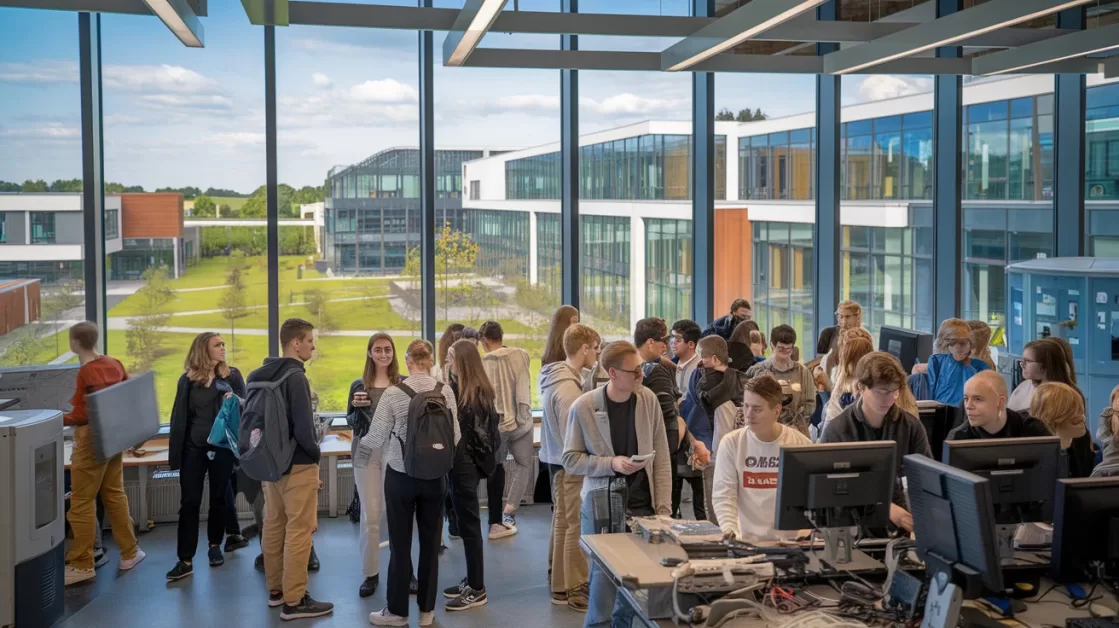
Germany stands at the forefront of engineering innovation, boasting world-class universities that have produced some of the greatest minds in the field. For aspiring engineers, the allure of studying in a country renowned for its technological prowess is undeniable. But with so many options available, how does one navigate the landscape of German higher education?
Choosing the right university can be a daunting task, especially for international students. The pressure to make the perfect choice, coupled with the complexities of studying abroad, can be overwhelming. However, understanding the top universities, their specializations, and the opportunities they offer can transform this challenge into an exciting journey towards a successful engineering career.
This comprehensive guide will explore the crème de la crème of German engineering education, delving into everything from admission requirements to industry connections. Whether you’re interested in mechanical, electrical, or chemical engineering, we’ll help you unlock the doors to Germany’s engineering excellence. Let’s embark on this journey to discover the top universities that could shape your future in engineering!
Top-ranked German universities for engineering
Germany is renowned for its excellent engineering education, with several universities consistently ranking among the world’s best. Here are four top-ranked German universities for engineering:
A. Technical University of Munich
The Technical University of Munich (TUM) is consistently ranked as one of the best engineering schools in Germany. Known for its cutting-edge research and strong industry connections, TUM offers a wide range of engineering programs in English and German.
B. RWTH Aachen University
RWTH Aachen University is another prestigious institution for engineering studies in Germany. It is particularly famous for its mechanical engineering and automotive engineering programs.
C. Karlsruhe Institute of Technology
The Karlsruhe Institute of Technology (KIT) is renowned for its research-oriented approach and strong focus on innovation. It offers a diverse range of engineering disciplines, including electrical engineering and computer science.
D. Technical University of Berlin
The Technical University of Berlin (TU Berlin) is known for its interdisciplinary approach to engineering education. It offers programs that combine traditional engineering disciplines with emerging technologies.
University | Notable Engineering Programs | Language of Instruction |
|---|---|---|
TUM | Aerospace, Robotics | German and English |
RWTH Aachen | Mechanical, Automotive | Primarily German |
KIT | Electrical, Computer Science | German and some English |
TU Berlin | Industrial, Environmental | German and some English |
These universities offer:
State-of-the-art facilities
Internationally recognized degrees
Opportunities for practical experience
Strong alumni networks
With their excellent reputations and comprehensive programs, these institutions provide outstanding opportunities for students looking to study engineering in Germany.
Specializations in engineering offered

German universities are renowned for their diverse and cutting-edge engineering programs. Let’s explore the main specializations available:
A. Mechanical Engineering
Mechanical engineering is a cornerstone of German industry. Programs focus on:
Design and manufacturing of machinery
Robotics and automation
Thermal systems and energy conversion
B. Electrical Engineering
German universities excel in electrical engineering, offering specializations in:
Power systems and renewable energy
Microelectronics and nanotechnology
Communications and signal processing
C. Civil Engineering
Civil engineering programs in Germany emphasize:
Structural engineering and construction management
Environmental engineering and sustainability
Transportation systems and urban planning
D. Chemical Engineering
Chemical engineering courses cover:
Process engineering and plant design
Biotechnology and pharmaceutical engineering
Materials science and nanotechnology
E. Aerospace Engineering
Germany’s aerospace engineering programs are world-class, focusing on:
Aircraft and spacecraft design
Propulsion systems and aerodynamics
Avionics and control systems
Specialization | Key Focus Areas | Notable German Universities |
|---|---|---|
Mechanical | Robotics, Manufacturing | TU Munich, RWTH Aachen |
Electrical | Power Systems, Microelectronics | TU Berlin, KIT |
Civil | Structural, Environmental | TU Dresden, TU Darmstadt |
Chemical | Process Engineering, Biotechnology | TU Hamburg, University of Stuttgart |
Aerospace | Aircraft Design, Propulsion | University of Stuttgart, TU Munich |
These specializations offer students the opportunity to gain expertise in specific areas of engineering, aligning with Germany’s industrial strengths and technological advancements. The programs typically combine theoretical knowledge with practical experience, often including internships or cooperative education opportunities with leading German companies.
Admission requirements for international students
International students aspiring to study engineering in Germany must meet specific admission criteria. These requirements ensure that students are well-prepared for the rigorous academic programs offered by top German universities.
A. Language proficiency
Proficiency in German or English is crucial for admission to engineering programs in Germany. Most universities require:
German language: TestDaF (Test Deutsch als Fremdsprache) with a minimum score of TDN 4 in all sections, or DSH (Deutsche Sprachprüfung für den Hochschulzugang) level 2 or 3.
English language: TOEFL iBT (minimum 80-100) or IELTS (minimum 6.5-7.0), depending on the university and program.
B. Academic qualifications
Students must have:
A secondary school leaving certificate equivalent to the German Abitur
Excellent grades in mathematics, physics, and other science subjects
C. Standardized test scores
Some universities may require:
GRE (Graduate Record Examination) for master’s programs
TestAS (Test for Academic Studies) for bachelor’s programs
D. Application process
The application process typically involves:
Choosing a program and university
Checking specific admission requirements
Preparing necessary documents (transcripts, certificates, motivation letter)
Submitting the application through uni-assist or directly to the university
Paying application fees
Waiting for the admission decision
Document | Purpose |
|---|---|
Secondary school certificate | Proof of completed education |
Language proficiency certificate | Demonstrates language skills |
Motivation letter | Explains interest in the program |
Letters of recommendation | Supports academic abilities |
Now that we’ve covered the admission requirements, let’s explore the tuition fees and funding options available for international students pursuing engineering degrees in Germany.
Tuition fees and funding options

State-funded universities
One of the most attractive aspects of studying engineering in Germany is the low tuition fees at state-funded universities. Most public universities in Germany offer free education to both domestic and international students, charging only a small semester fee for administrative costs and student services. This fee typically ranges from €150 to €350 per semester, making German engineering education highly accessible and affordable.
Scholarship opportunities
Numerous scholarship opportunities are available for international students pursuing engineering degrees in Germany. Some notable options include:
Scholarship | Provider | Coverage |
|---|---|---|
DAAD Scholarships | German Academic Exchange Service | Full or partial funding |
Deutschlandstipendium | German Federal Government | €300 monthly |
Heinrich Böll Foundation Scholarships | Heinrich Böll Foundation | Full funding |
Erasmus+ | European Union | Partial funding |
Part-time work regulations
International students in Germany are allowed to work part-time to supplement their income. The regulations permit:
120 full days or 240 half days per year
Unlimited work hours for on-campus jobs
Internships related to the field of study
Living expenses in Germany
While tuition fees are low, students should budget for living expenses. The average monthly costs include:
Accommodation: €300-€600
Food: €200-€300
Health insurance: €80-€160
Transportation: €50-€100
Miscellaneous: €100-€200
Total monthly expenses typically range from €730 to €1,360, depending on the city and lifestyle. With careful planning and budgeting, studying engineering in Germany can be an affordable and rewarding experience.
Industry connections and career prospects

German universities renowned for engineering programs boast strong industry connections, offering students excellent career prospects. These institutions have cultivated relationships with leading companies, creating a seamless transition from academia to the professional world.
Internship programs
Many German universities have established internship programs, allowing students to gain hands-on experience in their chosen field. These programs often lead to full-time employment opportunities after graduation.
University | Notable Internship Partners |
|---|---|
TU Munich | BMW, Siemens, Audi |
RWTH Aachen | Bosch, Continental, Evonik |
TU Berlin | Volkswagen, Deutsche Bahn, Airbus |
Research opportunities
German universities are at the forefront of engineering research, providing students with cutting-edge facilities and collaborative projects with industry partners.
Joint research initiatives with multinational corporations
Access to state-of-the-art laboratories and equipment
Opportunities to contribute to groundbreaking innovations
Job placement rates
Engineering graduates from top German universities enjoy high job placement rates, often securing positions before completing their studies.
German companies hiring engineering graduates
Several renowned German companies actively recruit engineering graduates from top universities:
Siemens
Bosch
Volkswagen Group
BMW
BASF
These industry connections and career prospects make studying engineering in Germany an attractive option for international students seeking world-class education and promising career opportunities.
Student life and campus facilities

International student support
German universities excel in providing comprehensive support for international students. Most institutions offer dedicated international offices that assist with visa processes, accommodation, and cultural integration. Many universities also provide language courses and buddy programs to help international students acclimate to their new environment.
State-of-the-art laboratories
Engineering students in Germany benefit from cutting-edge facilities and equipment. Universities invest heavily in their laboratories, ensuring students have access to the latest technology and tools. This hands-on experience is crucial for practical learning and research opportunities.
|
Laboratory Type |
Equipment |
Benefits |
|---|---|---|
|
Robotics Lab |
Industrial robots, AI systems |
Practical experience with automation |
|
Materials Testing Lab |
Tensile testing machines, microscopes |
In-depth analysis of material properties |
|
Clean Room |
Lithography equipment, vacuum systems |
Microelectronics and nanotechnology research |
Student organizations and clubs
German universities boast a vibrant student life with numerous organizations and clubs catering to various interests. Engineering students can join technical societies, robotics clubs, or entrepreneurship groups to enhance their skills and network with peers.
Housing options
-
University dormitories: Affordable and conveniently located
-
Shared apartments (WGs): Popular among students for socializing
-
Private rentals: More independence but potentially higher costs
These housing options cater to different preferences and budgets, ensuring students can find suitable accommodation during their studies.
With these excellent facilities and support systems in place, international students pursuing engineering in Germany can look forward to a rich and rewarding academic experience. The combination of world-class education and vibrant campus life makes German universities an attractive choice for aspiring engineers from around the globe.
Conclusion
Germany stands out as a premier destination for engineering education, boasting world-class universities renowned for their cutting-edge research and industry connections. The top-ranked institutions offer a wide array of specializations, catering to diverse interests within the engineering field. International students seeking admission to these prestigious programs should be prepared to meet rigorous academic requirements and demonstrate proficiency in German or English, depending on the course language.
While tuition fees are generally lower compared to other countries, students should explore various funding options to support their studies. The strong industry partnerships cultivated by German universities provide excellent career prospects for graduates, with many programs incorporating internships and practical training. Combined with vibrant student life and state-of-the-art campus facilities, pursuing an engineering degree in Germany offers a holistic and enriching educational experience that prepares students for successful careers in the global engineering landscape.
Ready to explore? Start your visa application today and get one step closer to your adventure!
Don’t let uncertainties hold you back. Our team of expert overseas education consultants is readily available to assist you. Whether you have inquiries about:
- Specific document requirements
- Interview preparation tips
- Visa application timelines
We’re ready to provide personalized guidance tailored to your unique situation. Get in Touch Today at: +919041818122 and begin your journey with Vrinda International.
The information provided in this blog is for general guidance purposes only. Visa policies, application procedures, and fees are subject to change without prior notice. For the most accurate and up-to-date details, we recommend contacting us directly or consulting official sources. Feel free to reach out to us for personalized assistance with your visa application or travel needs.
FAQ - Frequently Asked Question
1. Why should I study engineering in Germany?
- Germany is renowned for its world-class education, particularly in engineering. The country is home to top-ranked universities that provide cutting-edge technology, research opportunities, and industry partnerships, making it an ideal destination for aspiring engineers.
2. Which are the top universities in Germany for engineering?
- Some of the top universities for engineering in Germany include:
- Technical University of Munich (TUM)
- RWTH Aachen UniversityUnderstanding Adaptive Cruise Control
- Karlsruhe Institute of Technology (KIT)
- Technical University of Berlin
- University of Stuttgart
- TU Darmstadt
3. Are engineering programs in Germany taught in English?
- Yes, many German universities offer engineering courses in English, especially at the master’s level. However, having some knowledge of German can be beneficial for daily life and job opportunities.
4. What are the eligibility requirements for engineering programs in Germany?
- The requirements vary by university and program, but generally, you will need:
- A recognized undergraduate degree (for master’s programs)
- Proof of English proficiency (IELTS/TOEFL) or German proficiency (TestDaF/DSH) depending on the language of instruction
- Academic transcripts and relevant documents
5. How much does it cost to study engineering in Germany?
- Many public universities in Germany charge low or no tuition fees for international students. However, there is typically a small administrative fee (around €150-€300 per semester). Private universities may charge higher fees.
6. What is the duration of engineering programs in Germany?
- Bachelor’s programs in engineering typically take 3-4 years to complete, while master’s programs generally take 2 years. The duration may vary depending on the university and program.
7. Can I work while studying engineering in Germany?
- Yes, international students are allowed to work part-time for up to 120 full days or 240 half days per year without a work permit. This helps students gain experience and support themselves financially during their studies.
8. Is it possible to get a scholarship for engineering courses in Germany?
- Yes, there are several scholarships available for international students pursuing engineering in Germany, including:
- DAAD Scholarships
- Deutschlandstipendium
- Erasmus+
- Scholarships offered by individual universities and private foundations
9. What are the career prospects after completing an engineering degree in Germany?
- Germany has a strong demand for skilled engineers, and graduates often find employment in sectors like automotive, mechanical, civil, electrical, and software engineering. Many international students receive job offers after completing their studies, and Germany also offers a post-study work visa for up to 18 months.
10. Do I need to learn German to study engineering in Germany?
- While many programs are taught in English, learning basic German can be beneficial, especially for part-time jobs, internships, and daily life. Fluency in German is essential if you plan to work in Germany long-term after graduation.
11. How do I apply to German universities for engineering programs?
- The application process usually involves:
- Applying directly through the university’s online portal or via Uni-Assist (a centralized service for international students)
- Submitting necessary documents like transcripts, proof of language proficiency, and a statement of purpose
- Checking individual university deadlines and requirements for specific programs
12. What are the top specializations in engineering offered by German universities?
- German universities offer a wide range of engineering specializations, including:
- Mechanical Engineering
- Electrical Engineering
- Civil Engineering
- Automotive Engineering
- Computer Engineering
- Aerospace Engineering
- Environmental Engineering
13. Can I stay in Germany after completing my engineering degree?
- Yes, after completing your degree, international students can apply for a Post-Study Work Visa (for 18 months) to search for employment in Germany. If you secure a job in your field, you can transition to a Skilled Worker Visa or apply for permanent residency after a few years of working.